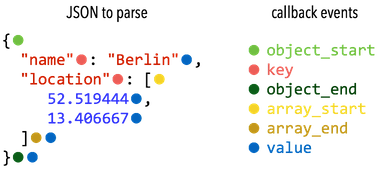nlohmann::basic_json::parser_callback_t¶
template<typename BasicJsonType>
using parser_callback_t =
std::function<bool(int depth, parse_event_t event, BasicJsonType& parsed)>;
With a parser callback function, the result of parsing a JSON text can be influenced. When passed to parse, it is called on certain events (passed as parse_event_t via parameter event) with a set recursion depth depth and context JSON value parsed. The return value of the callback function is a boolean indicating whether the element that emitted the callback shall be kept or not.
We distinguish six scenarios (determined by the event type) in which the callback function can be called. The following table describes the values of the parameters depth, event, and parsed.
parameter event | description | parameter depth | parameter parsed |
|---|---|---|---|
parse_event_t::object_start | the parser read { and started to process a JSON object | depth of the parent of the JSON object | a JSON value with type discarded |
parse_event_t::key | the parser read a key of a value in an object | depth of the currently parsed JSON object | a JSON string containing the key |
parse_event_t::object_end | the parser read } and finished processing a JSON object | depth of the parent of the JSON object | the parsed JSON object |
parse_event_t::array_start | the parser read [ and started to process a JSON array | depth of the parent of the JSON array | a JSON value with type discarded |
parse_event_t::array_end | the parser read ] and finished processing a JSON array | depth of the parent of the JSON array | the parsed JSON array |
parse_event_t::value | the parser finished reading a JSON value | depth of the value | the parsed JSON value |

Discarding a value (i.e., returning false) has different effects depending on the context in which function was called:
- Discarded values in structured types are skipped. That is, the parser will behave as if the discarded value was never read.
- In case a value outside a structured type is skipped, it is replaced with
null. This case happens if the top-level element is skipped.
Parameters¶
depth(in)- the depth of the recursion during parsing
event(in)- an event of type
parse_event_tindicating the context in the callback function has been called parsed(in, out)- the current intermediate parse result; note that writing to this value has no effect for
parse_event_t::keyevents
Return value¶
Whether the JSON value which called the function during parsing should be kept (true) or not (false). In the latter case, it is either skipped completely or replaced by an empty discarded object.
Examples¶
Example
The example below demonstrates the parse() function with and without callback function.
#include <iostream>
#include <iomanip>
#include <nlohmann/json.hpp>
using json = nlohmann::json;
int main()
{
// a JSON text
auto text = R"(
{
"Image": {
"Width": 800,
"Height": 600,
"Title": "View from 15th Floor",
"Thumbnail": {
"Url": "http://www.example.com/image/481989943",
"Height": 125,
"Width": 100
},
"Animated" : false,
"IDs": [116, 943, 234, 38793]
}
}
)";
// parse and serialize JSON
json j_complete = json::parse(text);
std::cout << std::setw(4) << j_complete << "\n\n";
// define parser callback
json::parser_callback_t cb = [](int depth, json::parse_event_t event, json & parsed)
{
// skip object elements with key "Thumbnail"
if (event == json::parse_event_t::key and parsed == json("Thumbnail"))
{
return false;
}
else
{
return true;
}
};
// parse (with callback) and serialize JSON
json j_filtered = json::parse(text, cb);
std::cout << std::setw(4) << j_filtered << '\n';
}
Output:
{
"Image": {
"Animated": false,
"Height": 600,
"IDs": [
116,
943,
234,
38793
],
"Thumbnail": {
"Height": 125,
"Url": "http://www.example.com/image/481989943",
"Width": 100
},
"Title": "View from 15th Floor",
"Width": 800
}
}
{
"Image": {
"Animated": false,
"Height": 600,
"IDs": [
116,
943,
234,
38793
],
"Title": "View from 15th Floor",
"Width": 800
}
}
Version history¶
- Added in version 1.0.0.